
maiar-ai
Maiar: A Composable, Plugin-Based AI Agent Framework
Stars: 63

MAIAR is a composable, plugin-based AI agent framework designed to abstract data ingestion, decision-making, and action execution into modular plugins. It enables developers to define triggers and actions as standalone plugins, while the core runtime handles decision-making dynamically. This framework offers extensibility, composability, and model-driven behavior, allowing seamless addition of new functionality. MAIAR's architecture is influenced by Unix pipes, ensuring highly composable plugins, dynamic execution pipelines, and transparent debugging. It remains declarative and extensible, allowing developers to build complex AI workflows without rigid architectures.
README:
MAIAR is designed around the thesis that AI agents, in their current iteration, primarily consist of three major steps:
- Data Ingestion & Triggers – What causes the AI to act.
- Decision-Making – How the AI determines the appropriate action.
- Action Execution – Carrying out the selected operation.
Instead of rigid workflows or monolithic agent logic, Maiar abstracts these steps into a modular, plugin-based system. Developers define triggers and actions as standalone plugins, while the core runtime dynamically handles decision-making. This enables a highly extensible, composable, and model driven framework where new functionality can be added seamlessly.
- Getting Started Running MAIAR
- Getting Started Contributing to MAIAR
- How It Works
- Pipes & Context Chains
- Extensibility & Modularity
- Design Principles
Welcome to MAIAR! This guide will help you set up and run your own AI agent using the MAIAR framework.
Before you begin, make sure you have the following installed:
nvm install 22.13.1
nvm use 22.13.1- Create a new directory for your project and initialize it:
mkdir my-maiar-agent
cd my-maiar-agentpnpm init- Install the core MAIAR packages, providers, and some starter plugins:
pnpm add @maiar-ai/core @maiar-ai/model-openai @maiar-ai/memory-sqlite @maiar-ai/plugin-terminal @maiar-ai/plugin-text dotenv- Create a new directory called
srcin your project root and create a new file calledindex.tsin it:
import "dotenv/config";
import path from "path";
import { createRuntime } from "@maiar-ai/core";
import { OpenAIProvider } from "@maiar-ai/model-openai";
import { SQLiteProvider } from "@maiar-ai/memory-sqlite";
import { ConsoleMonitorProvider } from "@maiar-ai/monitor-console";
import { PluginTerminal } from "@maiar-ai/plugin-terminal";
import { PluginTextGeneration } from "@maiar-ai/plugin-text";
const runtime = createRuntime({
models: [
new OpenAIProvider({
apiKey: process.env.OPENAI_API_KEY as string,
model: "gpt-3.5-turbo"
})
],
memory: new SQLiteProvider({
dbPath: path.join(process.cwd(), "data", "conversations.db")
}),
monitors: [new ConsoleMonitorProvider()],
plugins: [
new PluginTextGeneration(),
new PluginTerminal({ user: "test", agentName: "maiar-starter" })
]
});
// Start the runtime
console.log("Starting agent...");
runtime.start().catch((error) => {
console.error("Failed to start agent:", error);
process.exit(1);
});
// Handle shutdown gracefully
process.on("SIGINT", async () => {
console.log("Shutting down agent...");
await runtime.stop();
process.exit(0);
});- Create a
.envfile in your project root. For our example, we'll use the OpenAI API key:
[!INFO] Since we're using OpenAI's API for this quickstart, you'll need to:
- Create an OpenAI account at platform.openai.com
- Generate an API key in your account settings
- Add funds to your account to use the API
- Create a
.envfile with your API key as shown below
OPENAI_API_KEY=your_api_key_here- Add TypeScript configuration. Create a
tsconfig.json:
{
"compilerOptions": {
"target": "ES2020",
"module": "CommonJS",
"strict": true,
"esModuleInterop": true,
"skipLibCheck": true,
"forceConsistentCasingInFileNames": true,
"outDir": "./dist"
},
"include": ["src/**/*.ts"],
"exclude": ["node_modules"]
}- Add build and start scripts to your
package.jsonunder thescriptssection:
"build": "tsc",
"start": "node dist/index.js"- Build and start your agent:
pnpm build
pnpm start- Test your agent by starting
maiar-chat:
pnpm maiar-chatYou should see a terminal prompt to chat with your agent.
[!IMPORTANT]
Please make sure to checkout the contributing guide first and foremost
- Make sure you have the following installed:
nvm install 22.13.1
nvm use 22.13.1- The pnpm package manager explicitly - Required for managing the monorepo workspace and its dependencies efficiently
- Install the project dependencies:
# From the root of the repository
pnpm install- Start the development environment. You'll need two terminal windows:
Terminal 1 - Core Packages:
# From the root of the repository
pnpm devThis command watches for changes in the core packages (packages/**/*.ts) and automatically rebuilds them. It:
- Cleans any previous build state
- Builds all core packages
- Updates the
.build-completemarker file with current timestamp to indicate the core packages build is finished as a state file to communicate with the development project - Watches for changes and repeats the process
Terminal 2 - Development Project:
# From the root of the repository
cd maiar-starter # or your own development project
pnpm devThis command runs the starter project in development mode. It:
- Watches for changes in both the starter project's source files and the core packages through the
.build-completemarker file - Rebuilds the starter project
- Restarts the application automatically and handles exiting gracefully so orphaned processes are cleaned up
This setup ensures that changes to either the core packages or the starter project are automatically rebuilt and reflected in your running application, providing a seamless development experience.
[!NOTE]
The
maiar-starterproject serves as a reference implementation demonstrating how to develop against the core MAIAR packages. You can apply this same development setup to any project that depends on MAIAR packages - simply mirror the dev script configuration and.build-completemarker file handling shown in the starter project's package.json. The key focus of this repository is the core packages inpackages/*, withmaiar-starterserving as an example consumer.
At its core, MAIAR builds execution pipelines dynamically. When an event or request is received, the runtime:
- Processes triggers to determine when and how the AI should act.
- Uses model assisted reasoning to construct an execution pipeline.
- Runs plugins in sequence, modifying a structured context chain as it progresses.
Rather than hardcoding client logic, MAIAR produces emergent behavior by selecting the most relevant plugins and actions based on context. This enables adaptability and ensures that agents can evolve without rewriting core logic.
MAIAR's architecture is influenced by Unix pipes, where structured input flows through a sequence of operations, using a standard in and out data interface. Each plugin acts as an independent unit:
- Receives input (context) from prior steps
- Performs a specific operation
- Outputs a structured result to the next step
This structured context chain ensures:
- Highly composable plugins – New functionality can be added without modifying existing logic.
- Dynamic execution pipelines – Workflows are built on-the-fly rather than being hardcoded.
- Transparent debugging & monitoring – Each step in the chain is tracked and can be audited.
This design enables MAIAR to remain declarative and extensible, allowing developers to build complex AI workflows without locking themselves into rigid architectures.
MAIAR is intentionally unopinionated about external dependencies, ensuring developers have full control over their infrastructure. The framework avoids enforcing specific technologies, making it easy to integrate with:
- Database Adapters – Works with any database system.
- Model Providers – Supports OpenAI, local models, or custom integrations.
- Logging & Monitoring – Custom logging systems can be plugged in without modifying core logic.
- Future Expansions – As needs evolve, new capabilities can be added without disrupting existing workflows.
By maintaining a flexible core, MAIAR ensures that AI agents can adapt to different environments and use cases without unnecessary constraints.
- Plugin-First – Every capability, from event ingestion to action execution, is encapsulated in a plugin.
- Modular & Composable – No rigid loops, no hardcoded workflows. The agent dynamically assembles execution pipelines.
- Model Driven Behavior – Instead of pre-defined workflows, the AI evaluates its available tools and selects the best course of action.
- Declarative Plugin Interface – Plugins declare their triggers and actions, while the runtime orchestrates them.
- Pipes & Context Chains – Input flows through plugins in a structured sequence, mirroring Unix pipes.
- Extensibility & Flexibility – The core library avoids enforcing specific tools or integrations. It's designed around interfaces and providers that allow you to plug in your own tools and integrations.
- Effortless Development – Define a plugin, specify its triggers & actions, and the agent handles the rest.
- Dynamic AI Workflows – Pipelines are built on-the-fly, allowing flexible and emergent behavior.
- Composability-First – Standardized context chains make plugins reusable and easily integrable.
- Unopinionated & Extensible – Developers have full control over databases, models, and infrastructure choices.
MAIAR isn't just another AI agent framework—it's a declarative, extensible, and composable way to build intelligent applications. Whether you're adding new capabilities or integrating with existing platforms, MAIAR makes it simple.
For Tasks:
Click tags to check more tools for each tasksFor Jobs:
Alternative AI tools for maiar-ai
Similar Open Source Tools

maiar-ai
MAIAR is a composable, plugin-based AI agent framework designed to abstract data ingestion, decision-making, and action execution into modular plugins. It enables developers to define triggers and actions as standalone plugins, while the core runtime handles decision-making dynamically. This framework offers extensibility, composability, and model-driven behavior, allowing seamless addition of new functionality. MAIAR's architecture is influenced by Unix pipes, ensuring highly composable plugins, dynamic execution pipelines, and transparent debugging. It remains declarative and extensible, allowing developers to build complex AI workflows without rigid architectures.
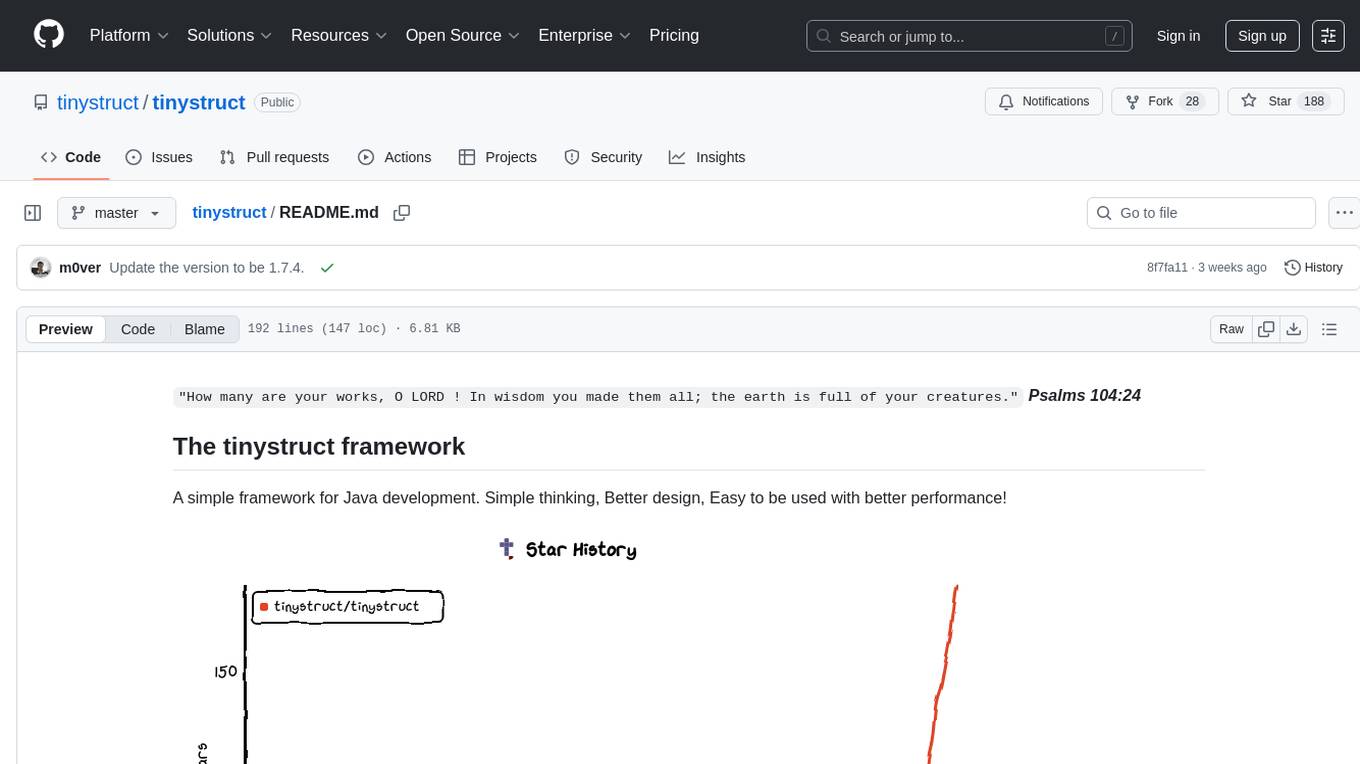
tinystruct
Tinystruct is a simple Java framework designed for easy development with better performance. It offers a modern approach with features like CLI and web integration, built-in lightweight HTTP server, minimal configuration philosophy, annotation-based routing, and performance-first architecture. Developers can focus on real business logic without dealing with unnecessary complexities, making it transparent, predictable, and extensible.
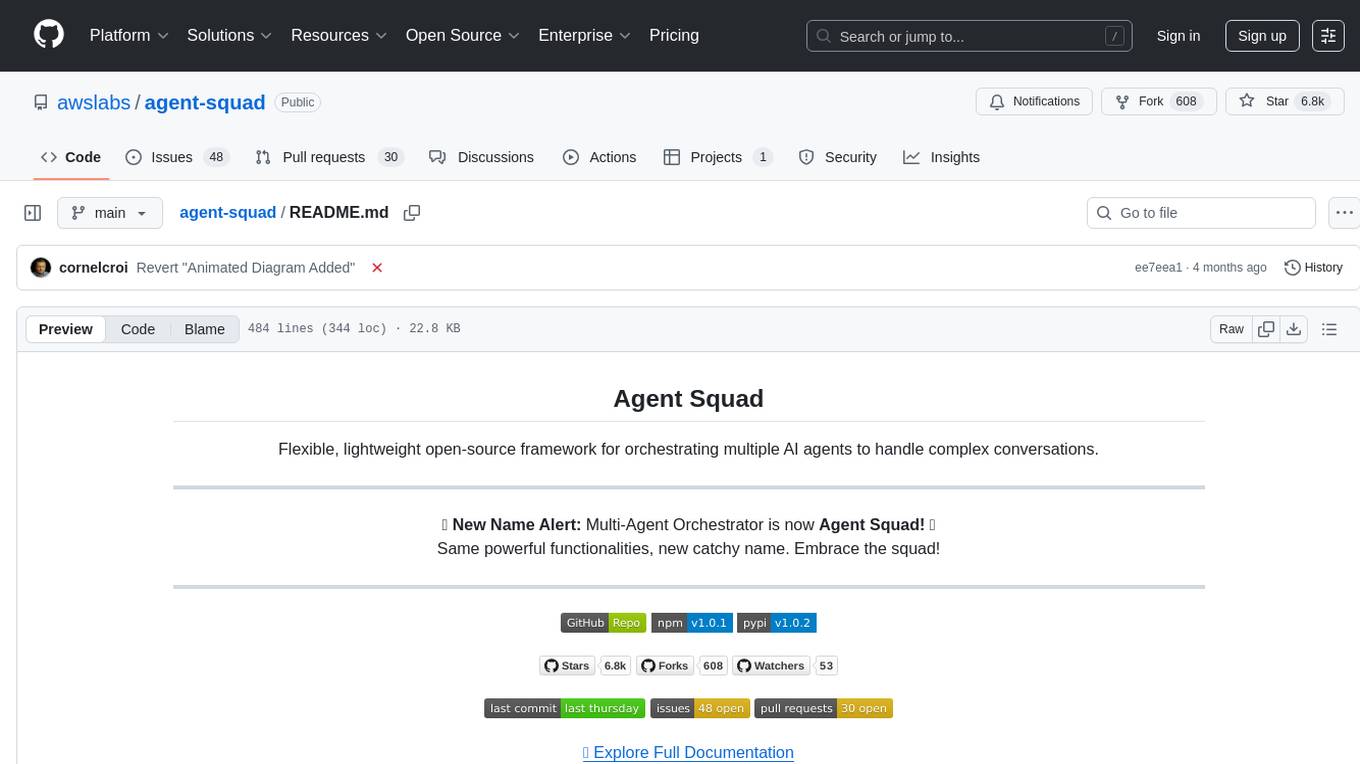
agent-squad
Agent Squad is a flexible, lightweight open-source framework for orchestrating multiple AI agents to handle complex conversations. It intelligently routes queries, maintains context across interactions, and offers pre-built components for quick deployment. The system allows easy integration of custom agents and conversation messages storage solutions, making it suitable for various applications from simple chatbots to sophisticated AI systems, scaling efficiently.

langmanus
LangManus is a community-driven AI automation framework that combines language models with specialized tools for tasks like web search, crawling, and Python code execution. It implements a hierarchical multi-agent system with agents like Coordinator, Planner, Supervisor, Researcher, Coder, Browser, and Reporter. The framework supports LLM integration, search and retrieval tools, Python integration, workflow management, and visualization. LangManus aims to give back to the open-source community and welcomes contributions in various forms.
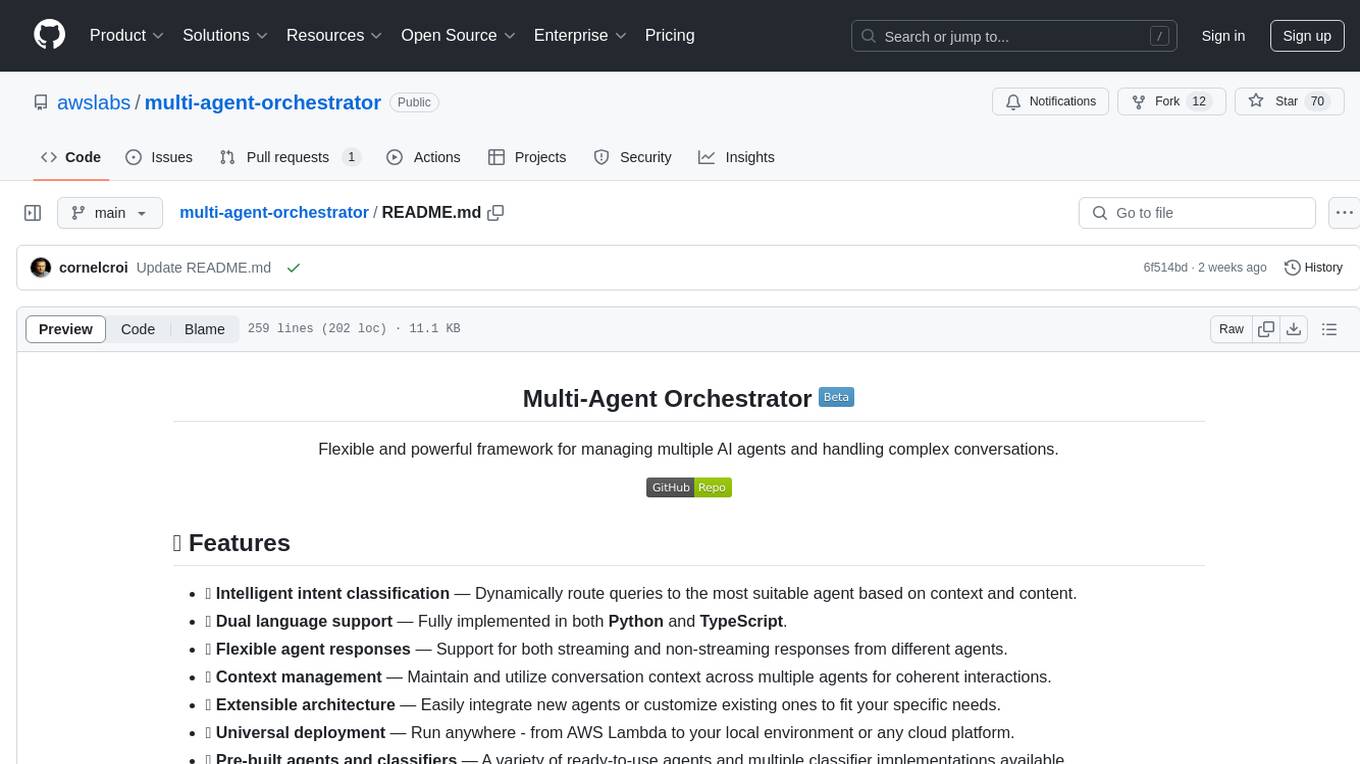
multi-agent-orchestrator
Multi-Agent Orchestrator is a flexible and powerful framework for managing multiple AI agents and handling complex conversations. It intelligently routes queries to the most suitable agent based on context and content, supports dual language implementation in Python and TypeScript, offers flexible agent responses, context management across agents, extensible architecture for customization, universal deployment options, and pre-built agents and classifiers. It is suitable for various applications, from simple chatbots to sophisticated AI systems, accommodating diverse requirements and scaling efficiently.
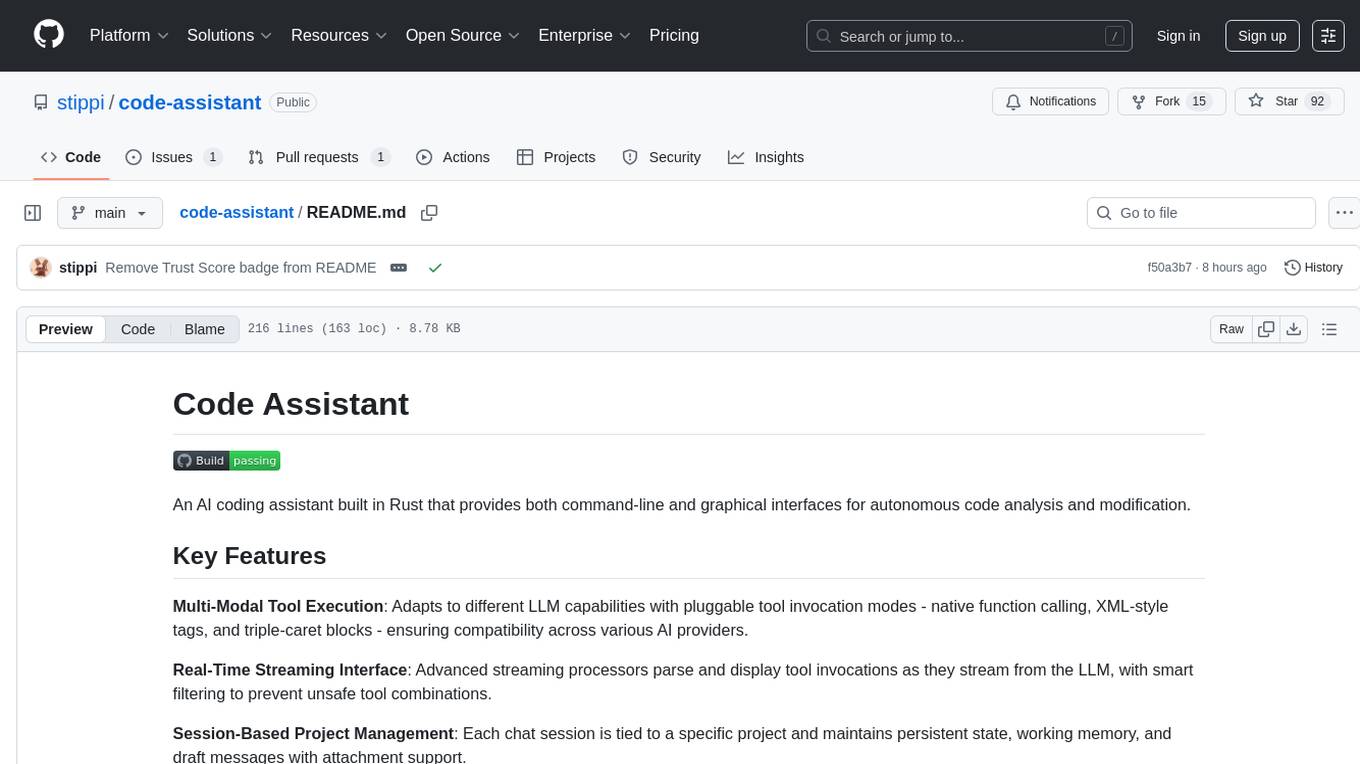
code-assistant
Code Assistant is an AI coding tool built in Rust that offers command-line and graphical interfaces for autonomous code analysis and modification. It supports multi-modal tool execution, real-time streaming interface, session-based project management, multiple interface options, and intelligent project exploration. The tool provides auto-loaded repository guidance and allows for project configuration with format-on-save feature. Users can interact with the tool in GUI, terminal, or MCP server mode, and configure LLM providers for advanced options. The architecture highlights adaptive tool syntax, smart tool filtering, and multi-threaded streaming for efficient performance. Contributions are welcome, and the roadmap includes features like block replacing in changed files, compact tool use failures, UI improvements, memory tools, security enhancements, fuzzy matching search blocks, editing user messages, and selecting in messages.
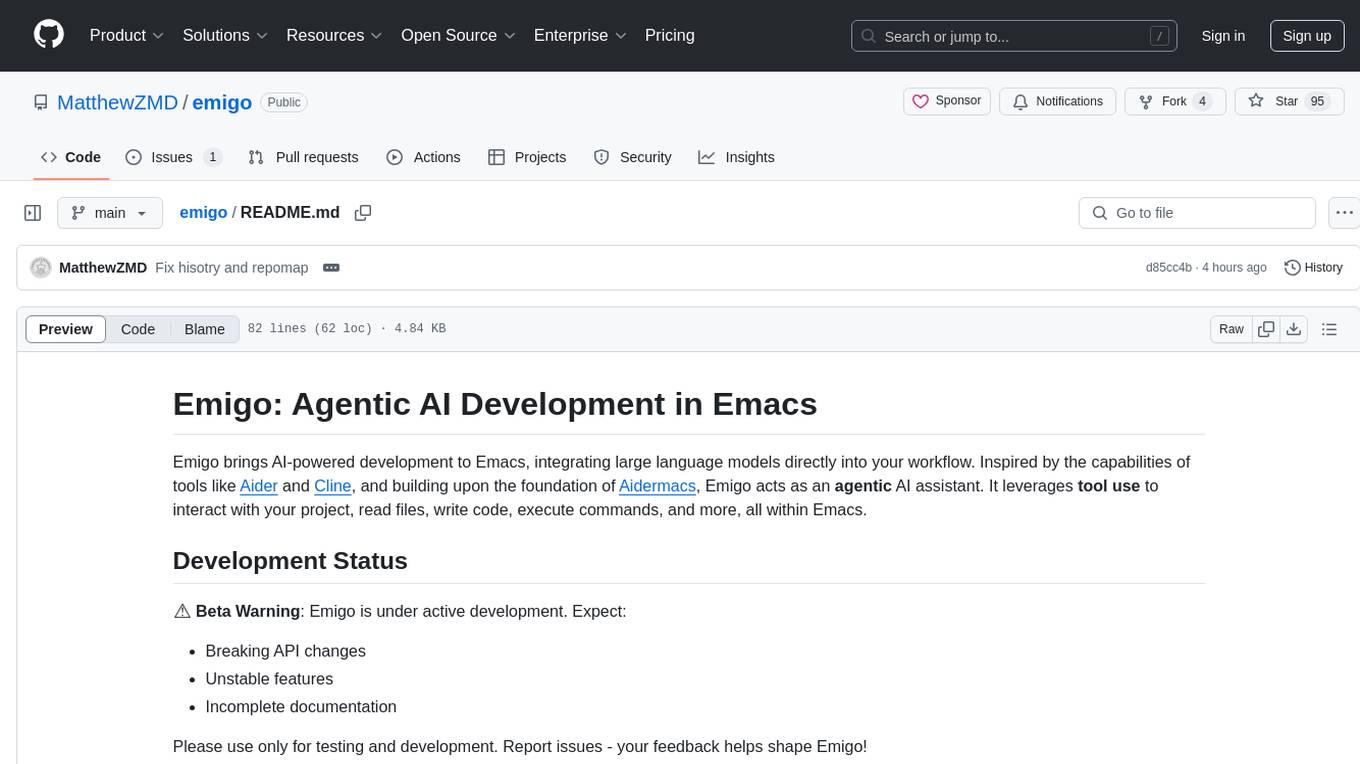
emigo
Emigo is an AI-powered development tool for Emacs that integrates large language models to interact with projects, read files, write code, execute commands, and more. It acts as an agentic AI assistant, leveraging tool use to enhance development workflows within Emacs. Emigo is actively developed, offering features like agentic tool use, Emacs integration, flexible LLM support, and context-aware interactions. Users can install Emigo with Python dependencies and configure it within Emacs for seamless integration. The tool's core strength lies in its agentic tool use, where the AI analyzes requests, selects appropriate tools, executes actions, and provides feedback, enabling users to accomplish complex tasks efficiently.
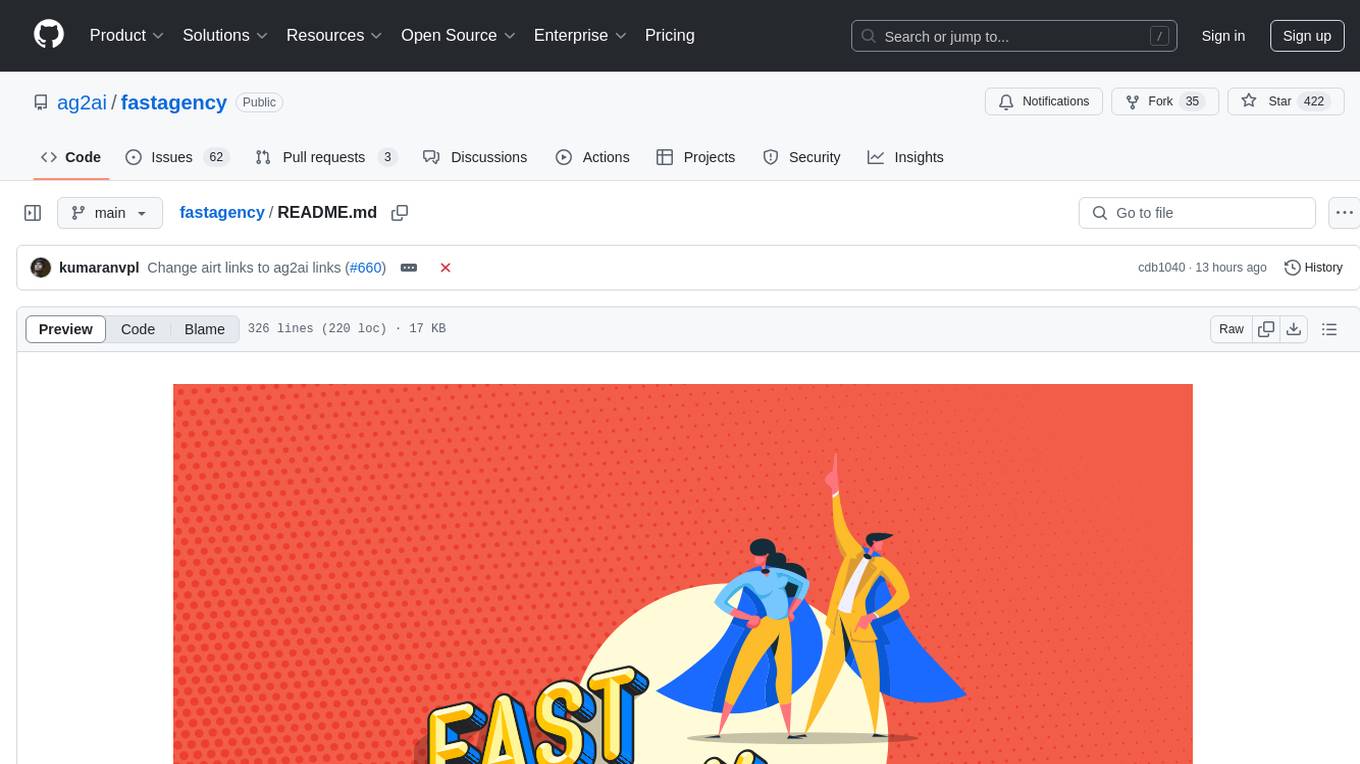
fastagency
FastAgency is an open-source framework designed to accelerate the transition from prototype to production for multi-agent AI workflows. It provides a unified programming interface for deploying agentic workflows written in AG2 agentic framework in both development and productional settings. With features like seamless external API integration, a Tester Class for continuous integration, and a Command-Line Interface (CLI) for orchestration, FastAgency streamlines the deployment process, saving time and effort while maintaining flexibility and performance. Whether orchestrating complex AI agents or integrating external APIs, FastAgency helps users quickly transition from concept to production, reducing development cycles and optimizing multi-agent systems.
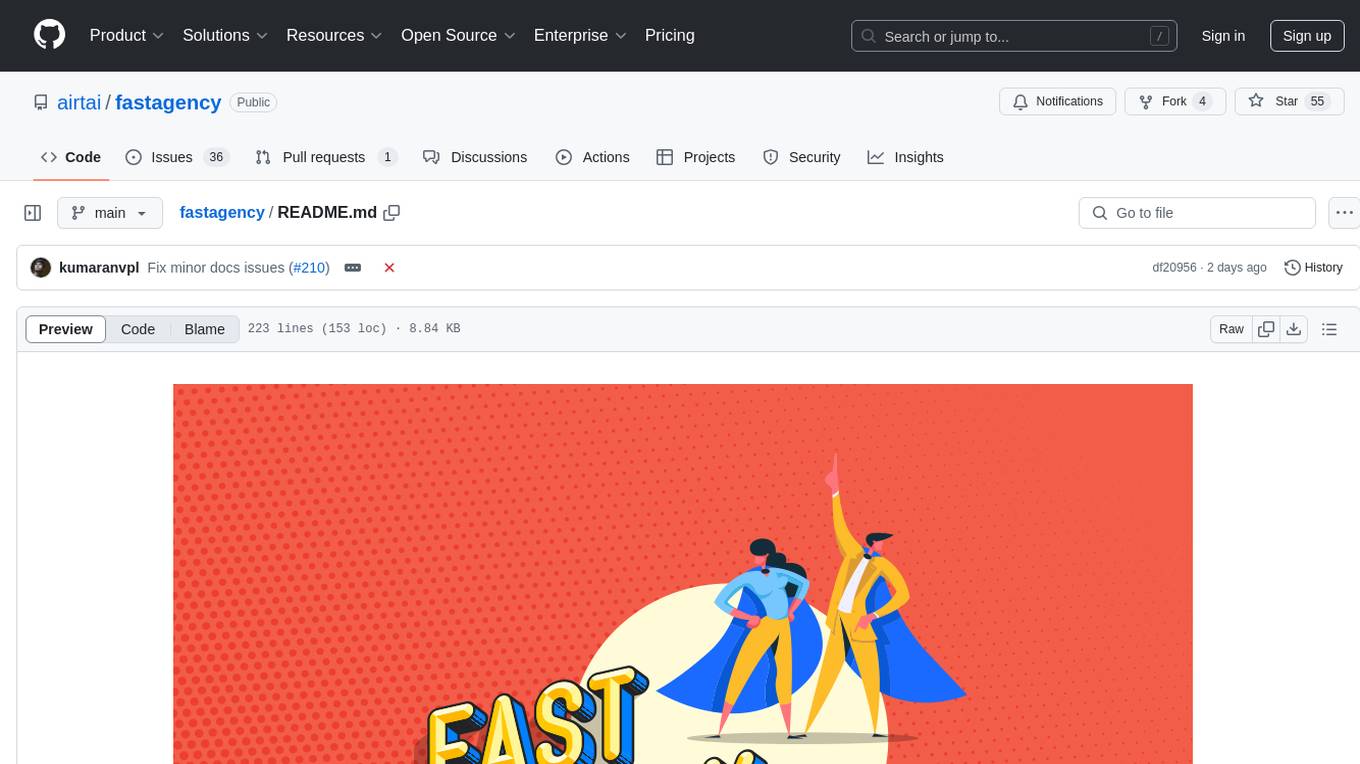
fastagency
FastAgency is a powerful tool that leverages the AutoGen framework to quickly build applications with multi-agent workflows. It supports various interfaces like ConsoleUI and MesopUI, allowing users to create interactive applications. The tool enables defining workflows between agents, such as students and teachers, and summarizing conversations. FastAgency aims to expand its capabilities by integrating with additional agentic frameworks like CrewAI, providing more options for workflow definition and AI tool integration.
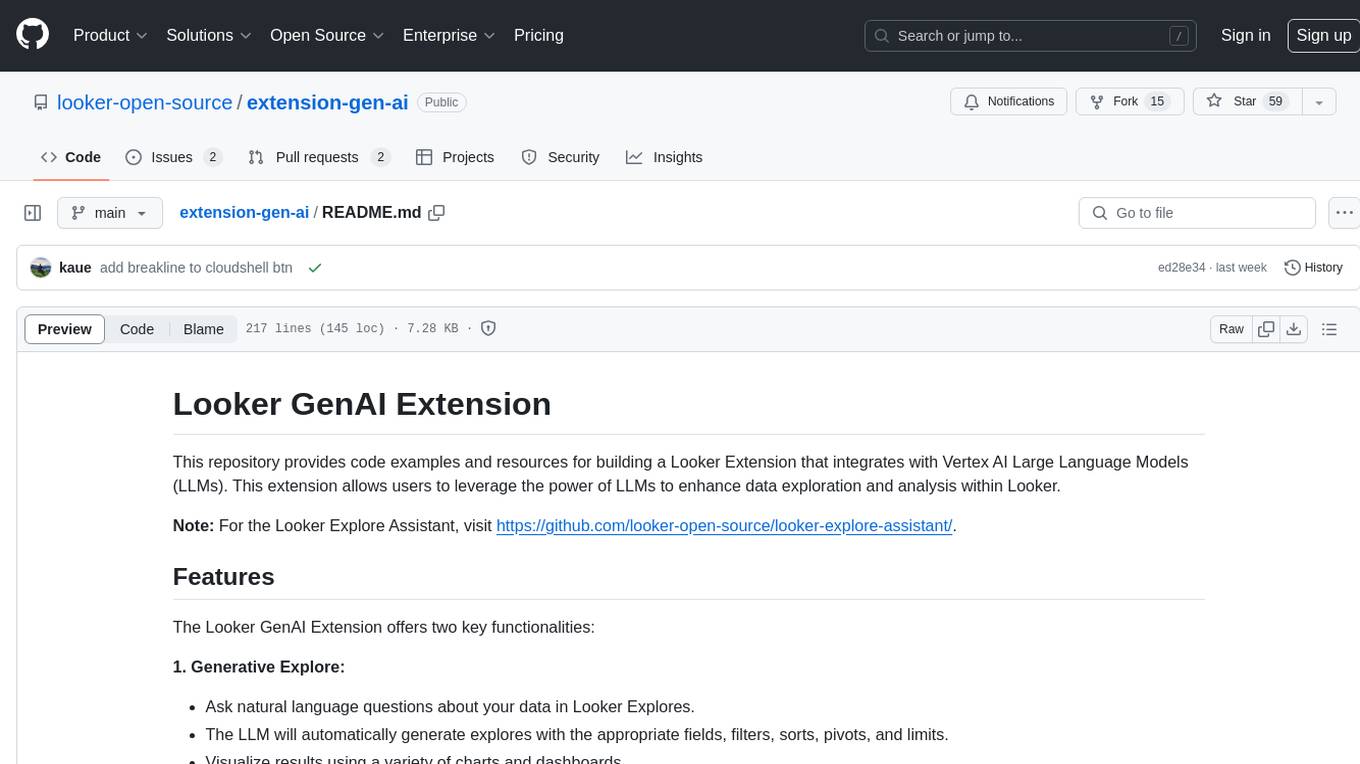
extension-gen-ai
The Looker GenAI Extension provides code examples and resources for building a Looker Extension that integrates with Vertex AI Large Language Models (LLMs). Users can leverage the power of LLMs to enhance data exploration and analysis within Looker. The extension offers generative explore functionality to ask natural language questions about data and generative insights on dashboards to analyze data by asking questions. It leverages components like BQML Remote Models, BQML Remote UDF with Vertex AI, and Custom Fine Tune Model for different integration options. Deployment involves setting up infrastructure with Terraform and deploying the Looker Extension by creating a Looker project, copying extension files, configuring BigQuery connection, connecting to Git, and testing the extension. Users can save example prompts and configure user settings for the extension. Development of the Looker Extension environment includes installing dependencies, starting the development server, and building for production.
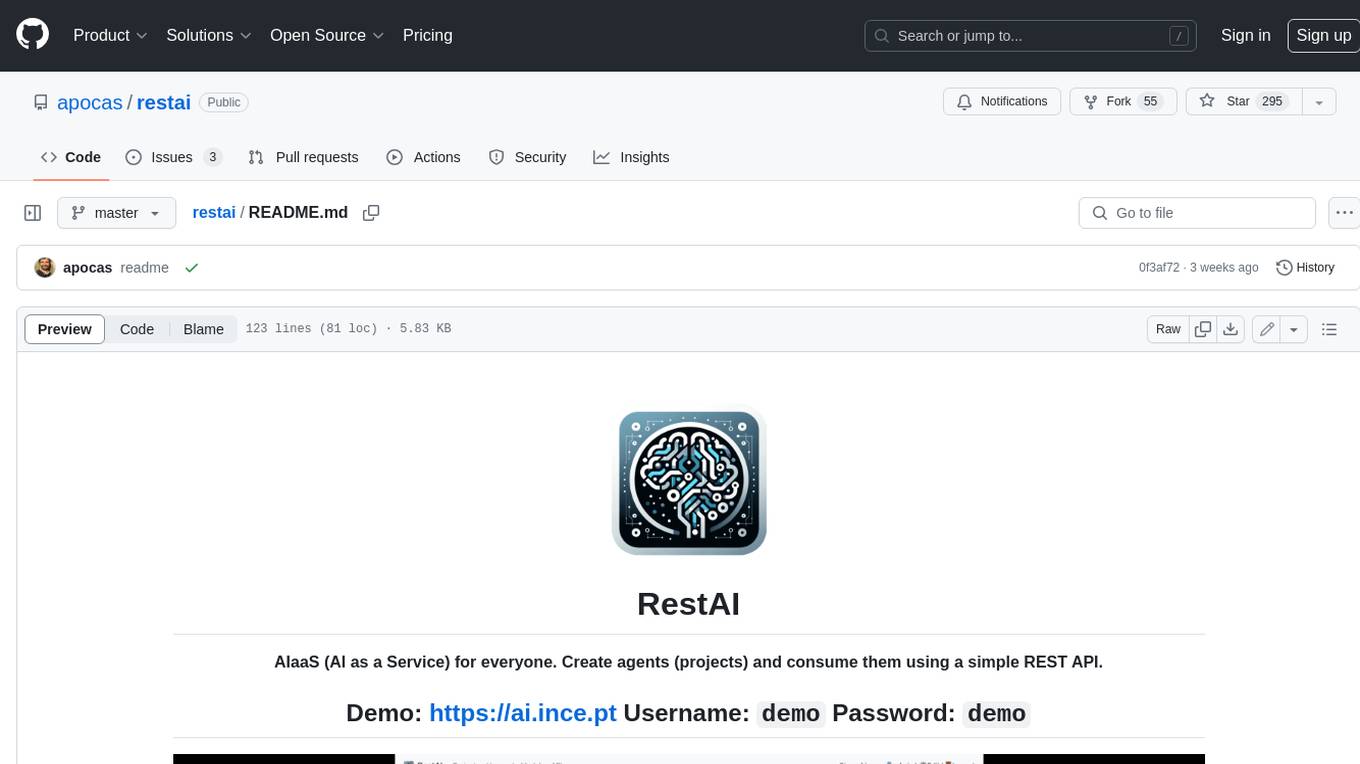
restai
RestAI is an AIaaS (AI as a Service) platform that allows users to create and consume AI agents (projects) using a simple REST API. It supports various types of agents, including RAG (Retrieval-Augmented Generation), RAGSQL (RAG for SQL), inference, vision, and router. RestAI features automatic VRAM management, support for any public LLM supported by LlamaIndex or any local LLM supported by Ollama, a user-friendly API with Swagger documentation, and a frontend for easy access. It also provides evaluation capabilities for RAG agents using deepeval.
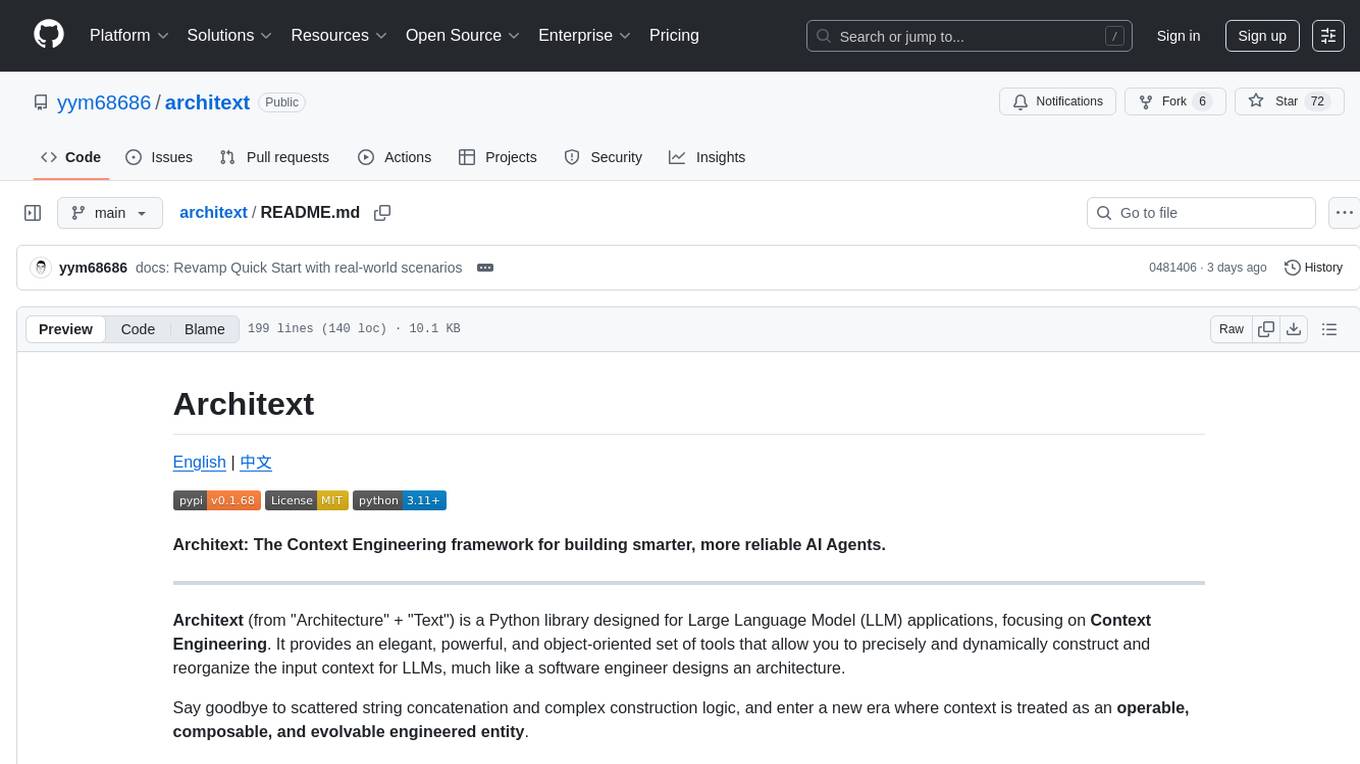
architext
Architext is a Python library designed for Large Language Model (LLM) applications, focusing on Context Engineering. It provides tools to construct and reorganize input context for LLMs dynamically. The library aims to elevate context construction from ad-hoc to systematic engineering, enabling precise manipulation of context content for AI Agents.

Biomni
Biomni is a general-purpose biomedical AI agent designed to autonomously execute a wide range of research tasks across diverse biomedical subfields. By integrating cutting-edge large language model (LLM) reasoning with retrieval-augmented planning and code-based execution, Biomni helps scientists dramatically enhance research productivity and generate testable hypotheses.
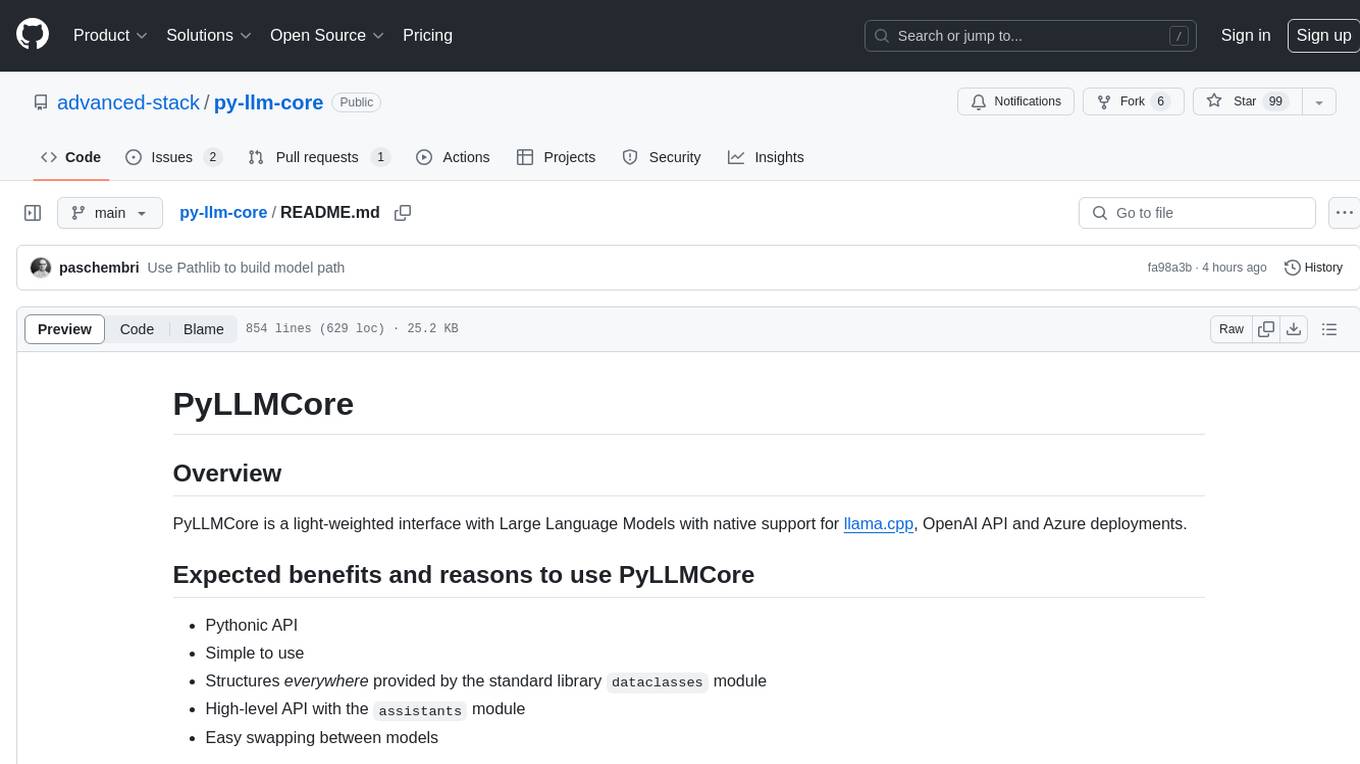
py-llm-core
PyLLMCore is a light-weighted interface with Large Language Models with native support for llama.cpp, OpenAI API, and Azure deployments. It offers a Pythonic API that is simple to use, with structures provided by the standard library dataclasses module. The high-level API includes the assistants module for easy swapping between models. PyLLMCore supports various models including those compatible with llama.cpp, OpenAI, and Azure APIs. It covers use cases such as parsing, summarizing, question answering, hallucinations reduction, context size management, and tokenizing. The tool allows users to interact with language models for tasks like parsing text, summarizing content, answering questions, reducing hallucinations, managing context size, and tokenizing text.
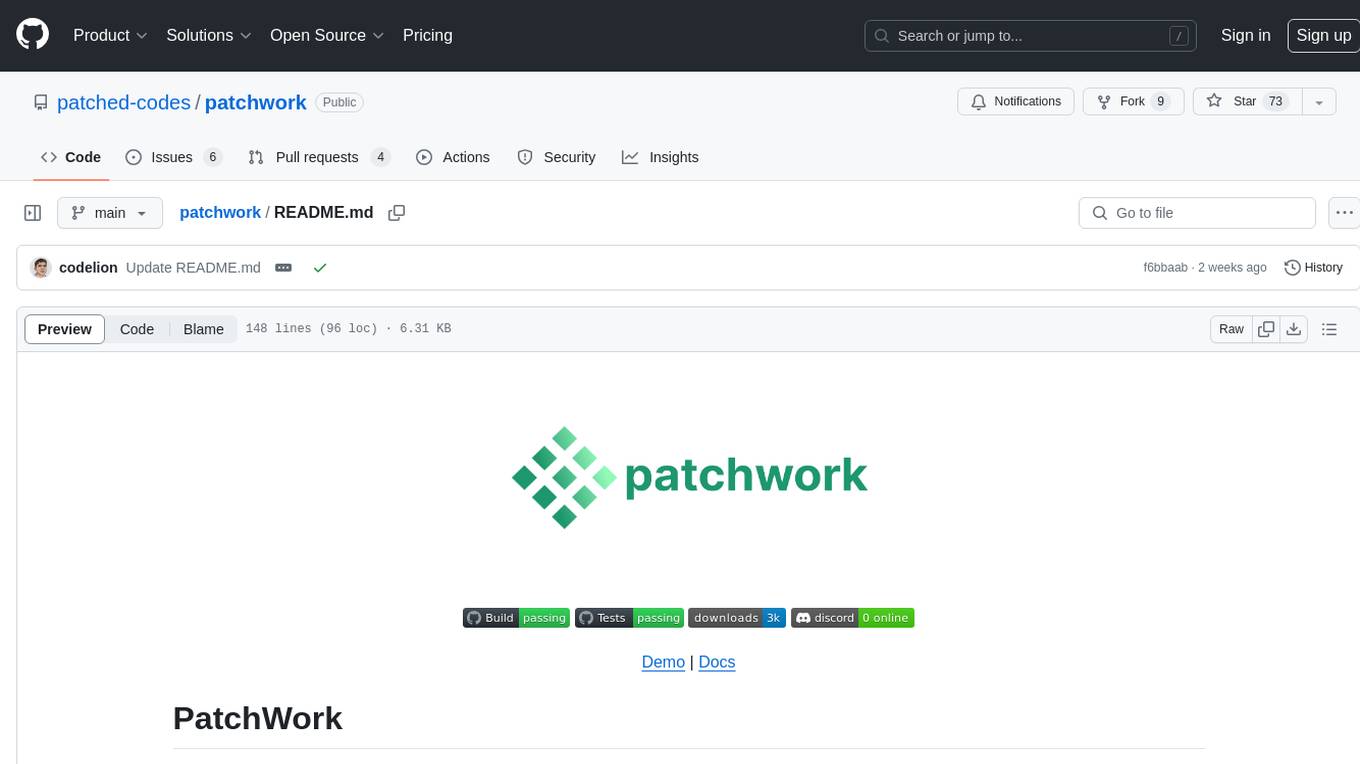
patchwork
PatchWork is an open-source framework designed for automating development tasks using large language models. It enables users to automate workflows such as PR reviews, bug fixing, security patching, and more through a self-hosted CLI agent and preferred LLMs. The framework consists of reusable atomic actions called Steps, customizable LLM prompts known as Prompt Templates, and LLM-assisted automations called Patchflows. Users can run Patchflows locally in their CLI/IDE or as part of CI/CD pipelines. PatchWork offers predefined patchflows like AutoFix, PRReview, GenerateREADME, DependencyUpgrade, and ResolveIssue, with the flexibility to create custom patchflows. Prompt templates are used to pass queries to LLMs and can be customized. Contributions to new patchflows, steps, and the core framework are encouraged, with chat assistants available to aid in the process. The roadmap includes expanding the patchflow library, introducing a debugger and validation module, supporting large-scale code embeddings, parallelization, fine-tuned models, and an open-source GUI. PatchWork is licensed under AGPL-3.0 terms, while custom patchflows and steps can be shared using the Apache-2.0 licensed patchwork template repository.
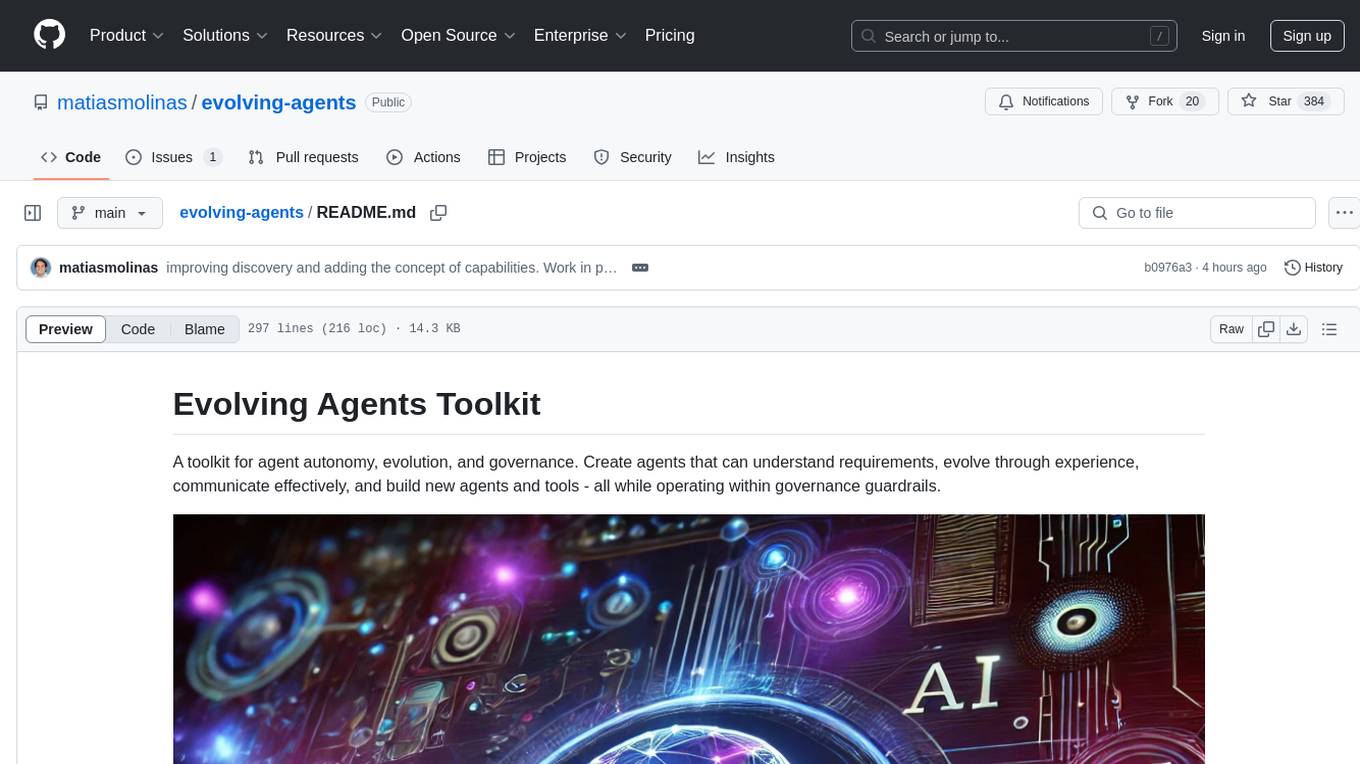
evolving-agents
A toolkit for agent autonomy, evolution, and governance enabling agents to learn from experience, collaborate, communicate, and build new tools within governance guardrails. It focuses on autonomous evolution, agent self-discovery, governance firmware, self-building systems, and agent-centric architecture. The toolkit leverages existing frameworks to enable agent autonomy and self-governance, moving towards truly autonomous AI systems.
For similar tasks

maiar-ai
MAIAR is a composable, plugin-based AI agent framework designed to abstract data ingestion, decision-making, and action execution into modular plugins. It enables developers to define triggers and actions as standalone plugins, while the core runtime handles decision-making dynamically. This framework offers extensibility, composability, and model-driven behavior, allowing seamless addition of new functionality. MAIAR's architecture is influenced by Unix pipes, ensuring highly composable plugins, dynamic execution pipelines, and transparent debugging. It remains declarative and extensible, allowing developers to build complex AI workflows without rigid architectures.
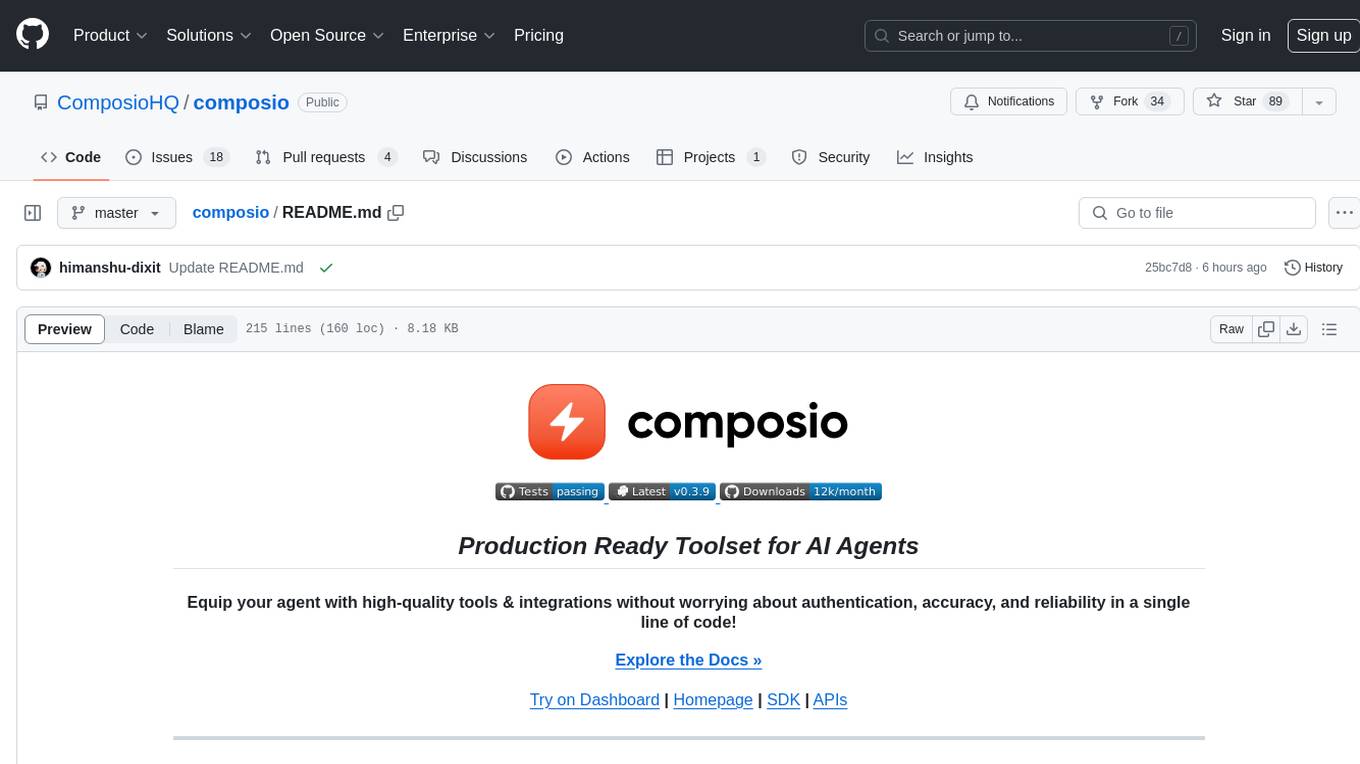
composio
Composio is a production-ready toolset for AI agents that enables users to integrate AI agents with various agentic tools effortlessly. It provides support for over 100 tools across different categories, including popular softwares like GitHub, Notion, Linear, Gmail, Slack, and more. Composio ensures managed authorization with support for six different authentication protocols, offering better agentic accuracy and ease of use. Users can easily extend Composio with additional tools, frameworks, and authorization protocols. The toolset is designed to be embeddable and pluggable, allowing for seamless integration and consistent user experience.
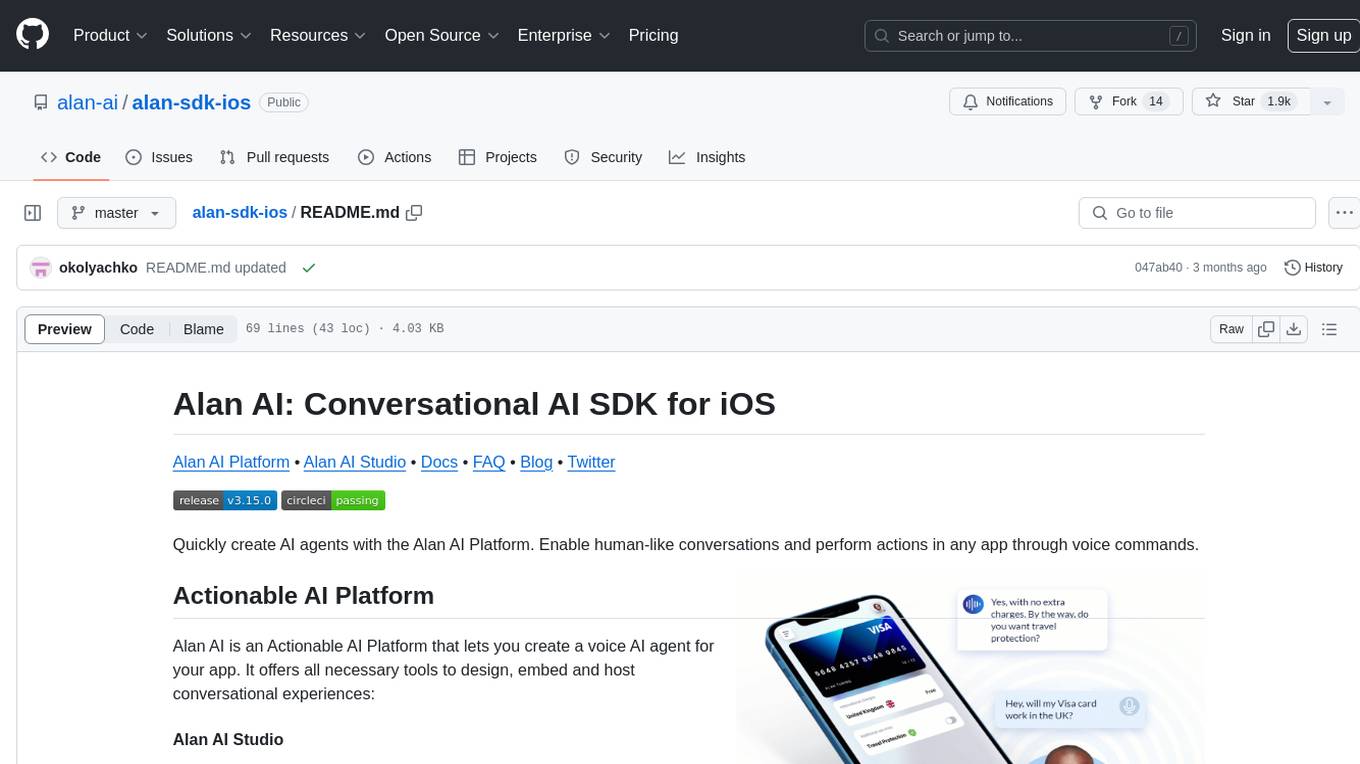
alan-sdk-ios
Alan AI SDK for iOS is a powerful tool that allows developers to quickly create AI agents for their iOS apps. With Alan AI Platform, users can easily design, embed, and host conversational experiences in their applications. The platform offers a web-based IDE called Alan AI Studio for creating dialog scenarios, lightweight SDKs for embedding AI agents, and a backend powered by top-notch speech recognition and natural language understanding technologies. Alan AI enables human-like conversations and actions through voice commands, with features like on-the-fly updates, dialog flow testing, and analytics.
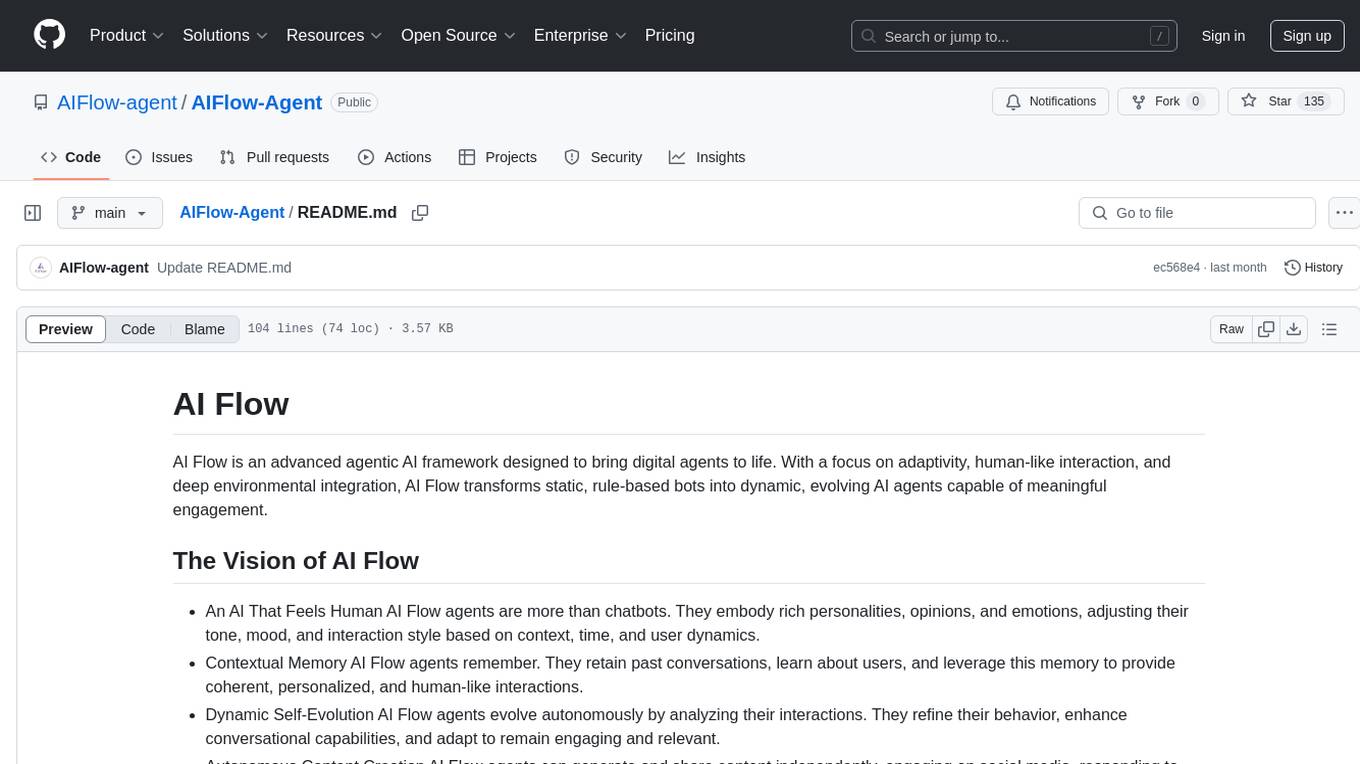
AIFlow-Agent
AI Flow is an advanced agentic AI framework that transforms static, rule-based bots into dynamic AI agents capable of meaningful engagement. It focuses on adaptivity, human-like interaction, and deep environmental integration. AI Flow agents embody rich personalities, opinions, and emotions, remember past conversations, evolve autonomously, create content independently, collaborate with other agents, and anticipate user needs without explicit prompts.
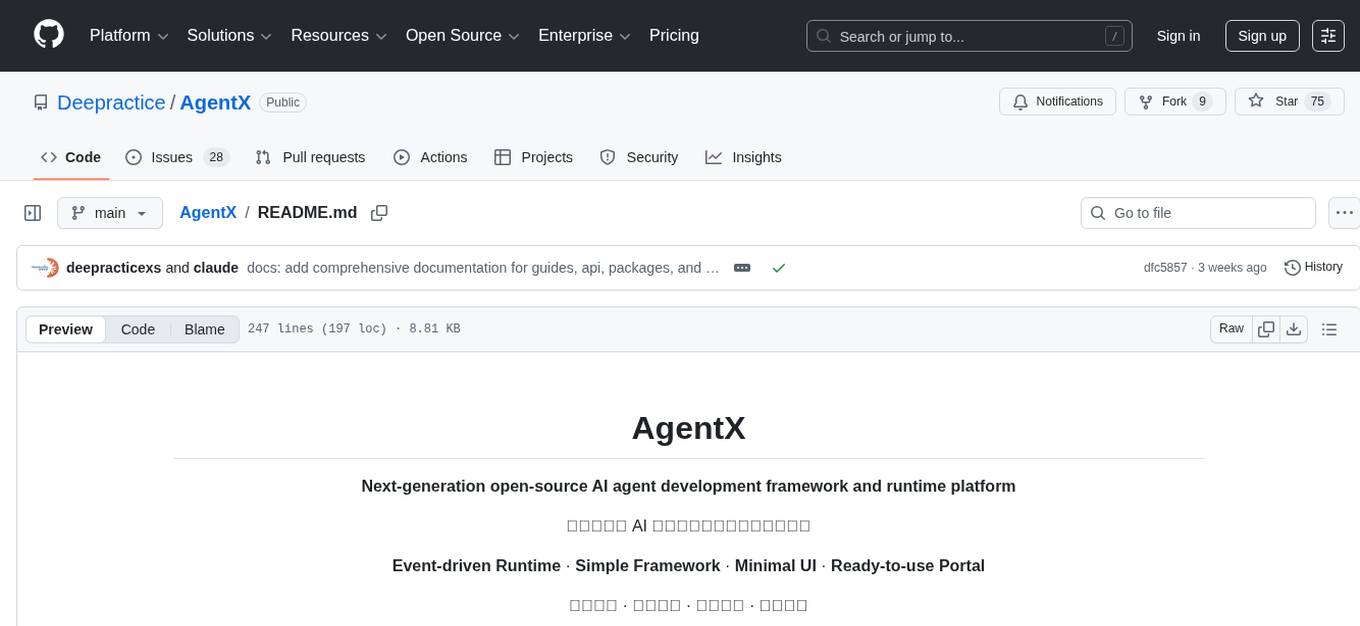
AgentX
AgentX is a next-generation open-source AI agent development framework and runtime platform. It provides an event-driven runtime with a simple framework and minimal UI. The platform is ready-to-use and offers features like multi-user support, session persistence, real-time streaming, and Docker readiness. Users can build AI Agent applications with event-driven architecture using TypeScript for server-side (Node.js) and client-side (Browser/React) development. AgentX also includes comprehensive documentation, core concepts, guides, API references, and various packages for different functionalities. The architecture follows an event-driven design with layered components for server-side and client-side interactions.
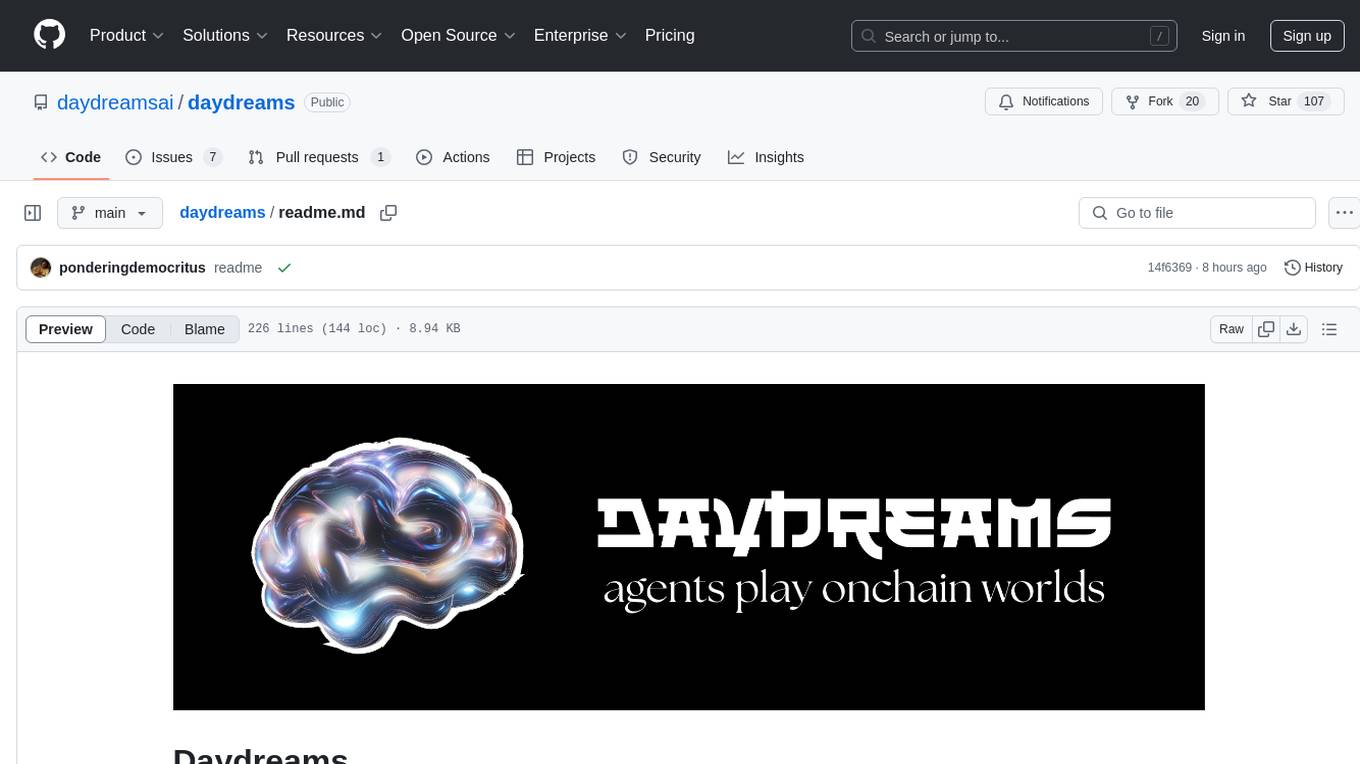
daydreams
Daydreams is a generative agent library designed for playing onchain games by injecting context. It is chain agnostic and allows users to perform onchain tasks, including playing any onchain game. The tool is lightweight and powerful, enabling users to define game context, register actions, set goals, monitor progress, and integrate with external agents. Daydreams aims to be 'lite' and 'composable', dynamically generating code needed to play games. It is currently in pre-alpha stage, seeking feedback and collaboration for further development.
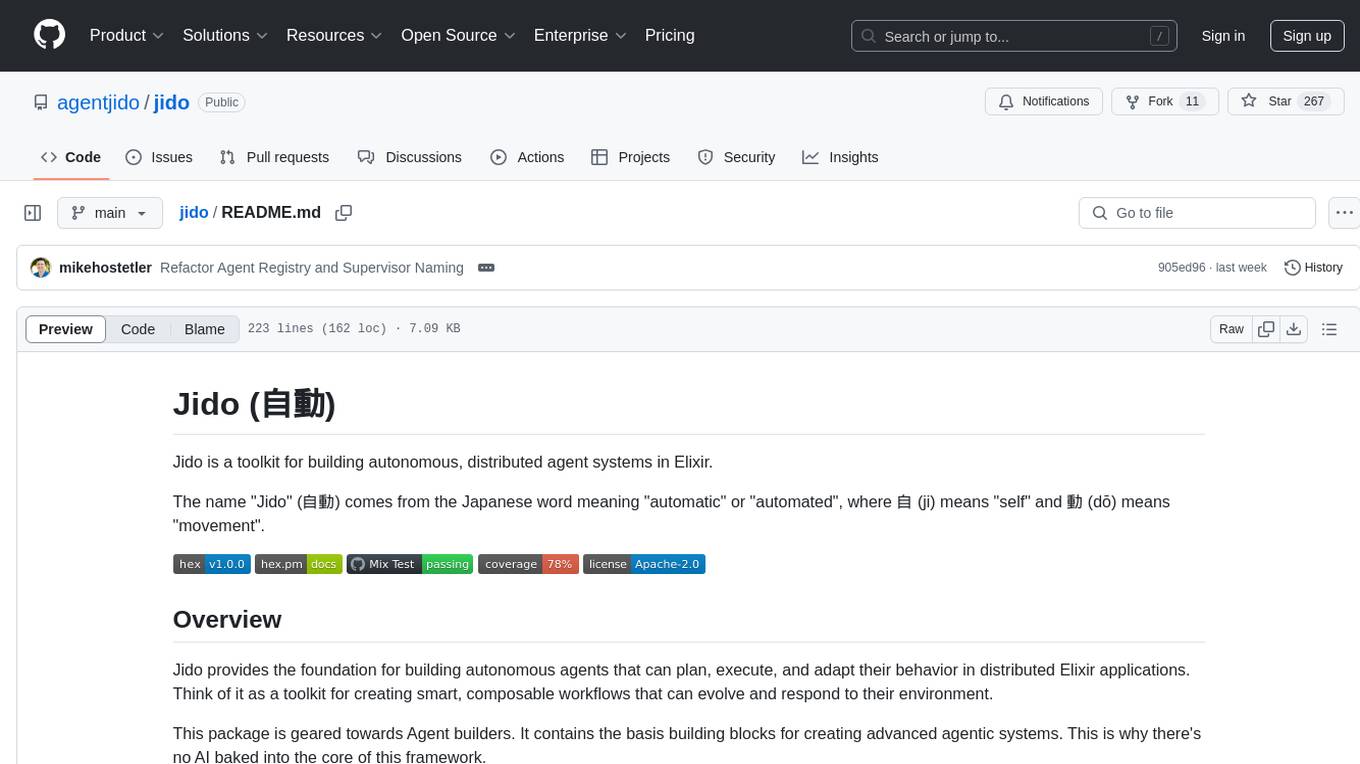
jido
Jido is a toolkit for building autonomous, distributed agent systems in Elixir. It provides the foundation for creating smart, composable workflows that can evolve and respond to their environment. Geared towards Agent builders, it contains core state primitives, composable actions, agent data structures, real-time sensors, signal system, skills, and testing tools. Jido is designed for multi-node Elixir clusters and offers rich helpers for unit and property-based testing.
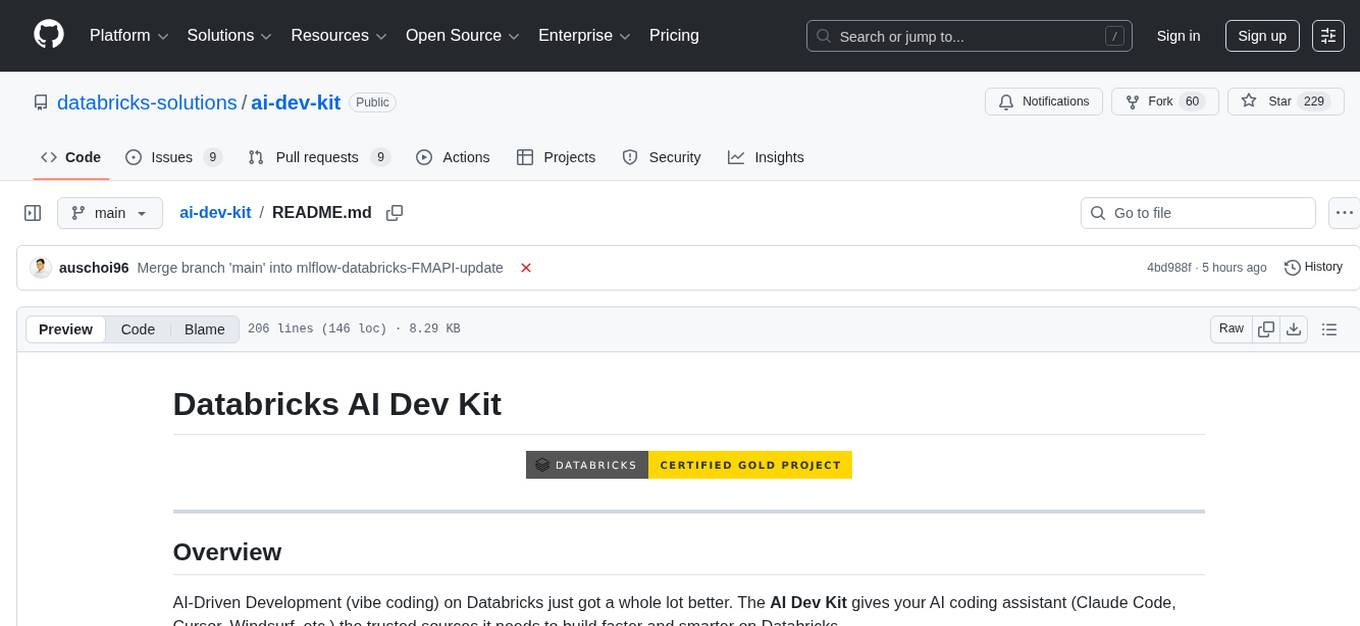
ai-dev-kit
The AI Dev Kit is a comprehensive toolkit designed to enhance AI-driven development on Databricks. It provides trusted sources for AI coding assistants like Claude Code and Cursor to build faster and smarter on Databricks. The kit includes features such as Spark Declarative Pipelines, Databricks Jobs, AI/BI Dashboards, Unity Catalog, Genie Spaces, Knowledge Assistants, MLflow Experiments, Model Serving, Databricks Apps, and more. Users can choose from different adventures like installing the kit, using the visual builder app, teaching AI assistants Databricks patterns, executing Databricks actions, or building custom integrations with the core library. The kit also includes components like databricks-tools-core, databricks-mcp-server, databricks-skills, databricks-builder-app, and ai-dev-project.
For similar jobs

sweep
Sweep is an AI junior developer that turns bugs and feature requests into code changes. It automatically handles developer experience improvements like adding type hints and improving test coverage.

teams-ai
The Teams AI Library is a software development kit (SDK) that helps developers create bots that can interact with Teams and Microsoft 365 applications. It is built on top of the Bot Framework SDK and simplifies the process of developing bots that interact with Teams' artificial intelligence capabilities. The SDK is available for JavaScript/TypeScript, .NET, and Python.

ai-guide
This guide is dedicated to Large Language Models (LLMs) that you can run on your home computer. It assumes your PC is a lower-end, non-gaming setup.

classifai
Supercharge WordPress Content Workflows and Engagement with Artificial Intelligence. Tap into leading cloud-based services like OpenAI, Microsoft Azure AI, Google Gemini and IBM Watson to augment your WordPress-powered websites. Publish content faster while improving SEO performance and increasing audience engagement. ClassifAI integrates Artificial Intelligence and Machine Learning technologies to lighten your workload and eliminate tedious tasks, giving you more time to create original content that matters.

chatbot-ui
Chatbot UI is an open-source AI chat app that allows users to create and deploy their own AI chatbots. It is easy to use and can be customized to fit any need. Chatbot UI is perfect for businesses, developers, and anyone who wants to create a chatbot.

BricksLLM
BricksLLM is a cloud native AI gateway written in Go. Currently, it provides native support for OpenAI, Anthropic, Azure OpenAI and vLLM. BricksLLM aims to provide enterprise level infrastructure that can power any LLM production use cases. Here are some use cases for BricksLLM: * Set LLM usage limits for users on different pricing tiers * Track LLM usage on a per user and per organization basis * Block or redact requests containing PIIs * Improve LLM reliability with failovers, retries and caching * Distribute API keys with rate limits and cost limits for internal development/production use cases * Distribute API keys with rate limits and cost limits for students

uAgents
uAgents is a Python library developed by Fetch.ai that allows for the creation of autonomous AI agents. These agents can perform various tasks on a schedule or take action on various events. uAgents are easy to create and manage, and they are connected to a fast-growing network of other uAgents. They are also secure, with cryptographically secured messages and wallets.

griptape
Griptape is a modular Python framework for building AI-powered applications that securely connect to your enterprise data and APIs. It offers developers the ability to maintain control and flexibility at every step. Griptape's core components include Structures (Agents, Pipelines, and Workflows), Tasks, Tools, Memory (Conversation Memory, Task Memory, and Meta Memory), Drivers (Prompt and Embedding Drivers, Vector Store Drivers, Image Generation Drivers, Image Query Drivers, SQL Drivers, Web Scraper Drivers, and Conversation Memory Drivers), Engines (Query Engines, Extraction Engines, Summary Engines, Image Generation Engines, and Image Query Engines), and additional components (Rulesets, Loaders, Artifacts, Chunkers, and Tokenizers). Griptape enables developers to create AI-powered applications with ease and efficiency.
